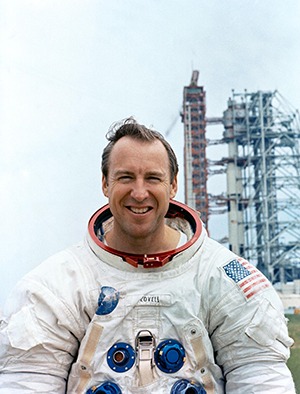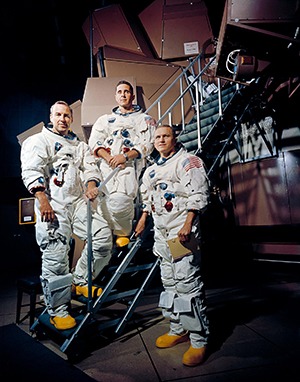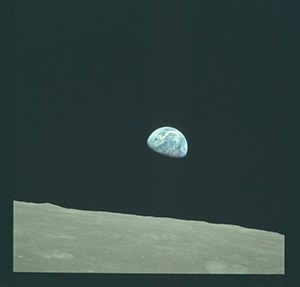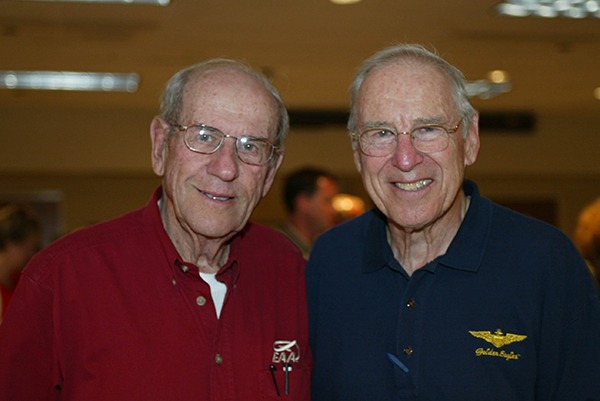
S70-34268 (April 1970) — Astronaut James A. Lovell Jr., commander of the Apollo 13 lunar landing mission, pauses for a quick photo while training for the Apollo 13 mission. Photo credit: NASA (Note, this is not the official Apollo portrait for James Lovell) NASA Photo
One of the most prominent pilots from the Midwest, James Arthur Lovell Jr, died August 8, 2025, at the age of 97, at his home in Lake Forest, Illinois.
Lovell was born in Cleveland, Ohio, grew up in Milwaukee, Wis., graduated from the University of Wisconsin, and became a naval aviator, test pilot, and mechanical engineer.
From 1954 to 1956 he flew McDonnell F2H Banshee “night fighters” and was deployed aboard the aircraft carrier USS Shangri-La, eventually completing 107 carrier landings.
In January 1958, Lovell transferred to the Naval Air Test Center (now the U.S. Naval Test Pilot School) where he graduated at the top of his class and provided pilot transition training in the North American FJ-4 Fury, McDonnell F3H Demon, and Vought F8U Crusader.
Lovell was then selected as part of NASA’s second astronaut class.
His first mission was as pilot of Gemini 7 in 1965, joining Commander Frank Borman on a 14-day endurance flight that included the first on-orbit rendezvous of two U.S. spacecraft when they flew tandem with Gemini 6A for three orbits, varying in distance between 1 and 300 feet. Lovell was later named commander of the final Gemini 12 mission in 1966.

S68-50265 (13 Nov. 1968) — These three astronauts are the prime crew of the Apollo 8 lunar orbit mission. Left to right, are James A. Lovell Jr., command module pilot; William A. Anders, lunar module pilot; and Frank Borman, commander. They are standing beside the Apollo Mission Simulator at the Kennedy Space Center (KSC). NASA Photo
On December 21, 1968, Apollo 8 launched to become the first human spaceflight to reach the Moon, with Lovell serving as command module pilot, accompanied by Borman and Bill Anders. The crew orbited the Moon not once, but 10 times without landing, then returned to Earth. The three astronauts were the first humans to see and photograph the far side of the Moon and an Earthrise.
In 1970, Lovell commanded the Apollo 13 lunar mission which experienced a critical mechanical failure enroute, looped around the Moon to build momentum, then returned safely to Earth without ever landing on the Moon. This mission became famous with the release of the motion picture “Apollo 13” in 1995, directed by Ron Howard and starring Tom Hanks as Lovell. Lovell himself was featured in the movie as the captain of the USS Iwo Jima, greeting the crew after splashdown and rescue, as they arrived on the carrier by helicopter. Lovell narrated the crew’s arrival, describing the cause of the explosion that crippled the spacecraft, and subsequent careers of he and his crew. Lovell stated then that he wondered if and when mankind would ever return to the Moon.

Photo by Bill Anders
Jack J. Pelton, CEO and Chairman of the Board of the Experimental Aircraft Association, said of Lovell’s passing:
“Jim Lovell was a hero to many of us as we followed the exploits of America’s space programs in the 1960s and ‘70s, and became known to new generations through the movie Apollo 13. His calm demeanor and focus on the mission were invaluable as commander of the crippled spacecraft during that epic flight in 1970.”
Upon his retirement from NASA in 1973, Lovell continued to be active in the aviation community. He made frequent visits to EAA AirVenture Oshkosh, as part of the “Salute to Apollo” program in 1994, the “Apollo 13 Anniversary” in 2015, the Apollo astronaut reunion in 2017, and as the main speaker for the Wright Brothers Memorial Banquet virtual event at the EAA Museum in 2020.
Also in 2017, Lovell lent his voice in strong support of general aviation’s objections to privatization of the nation’s air traffic control (ATC) system – a concept under consideration at the time.
That year, Lovell joined fellow aerospace icons Gen. Lloyd “Fig” Newton, Chesley “Sully” Sullenberger, renowned airshow performer Sean Tucker, and multiplatinum artist and accomplished pilot Dierks Bentley in a National Business Aviation Association (NBAA) video highlighting their significant concerns over ATC privatization.
ATC privatization is “a solution in search of a problem,” Lovell declared in the video, produced by NBAA in support of the GA community’s “ATC Not For Sale” advocacy campaign. Lovell later reiterated the same message at that year’s NBAA Business Aviation Convention & Exhibition (NBAA-BACE).
“Jim Lovell is an American hero who represented his country and all of humanity with distinction,” said NBAA President and CEO Ed Bolen. “We will remember him not only for his leadership in the fight against turning over our ATC system to a monopoly, but also his powerful example in maintaining focus and strength in the face of adversity.”
Lovell continued to draw upon his experiences at NASA and in the military throughout his life. In addition to sharing the harrowing tale of his first-ever night carrier landing at NBAA-BACE in 2017 – a lesson in resilience that would later serve him well on Apollo 13 – Lovell also discussed the importance of encouraging future generations to pursue careers in aviation and aerospace.
“There are lots of young people that are still very much interested in space technology [and] all aspects of aviation,” he told NBAA-TV in an interview held during that year’s convention. “We ought to encourage them to keep going ahead, because I think there’s a bright future still in aviation and space technology that hasn’t been explored yet.”
Preceding Lovell in death were fellow astronauts Frank Borman in 2023, Bill Anders in 2024, and many others.
